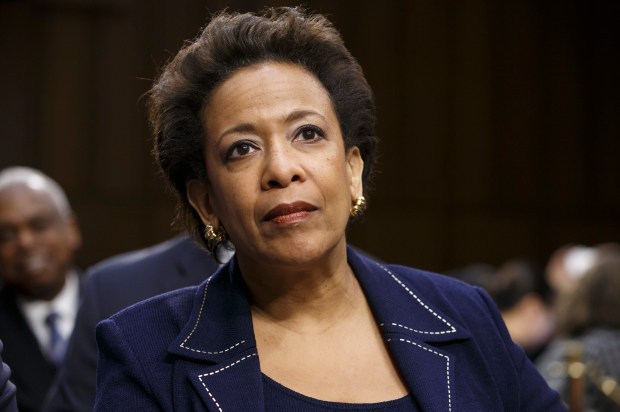Northwestern University has “robust” policies and training against hazing and bullying in place but a lack of clear guidance on how to respond to concerns from student-athletes could lead to inconsistent responses and the perception that complaints are not being properly addressed, a team led by former U.S. Attorney General Loretta Lynch concluded in a review that was commissioned last year in the wake of a football hazing scandal that expanded to allegations of abuse on other teams.
“While our recommendations are focused on the areas in which we believe improvement can and should be made, the results of our review have been largely positive,” Lynch and her team wrote in an executive summary of the report, released Thursday. “We have observed a commitment by the university and athletics department to the well-being of their student-athletes.”
Northwestern faces lawsuits from several former football players who accuse the school and ex-head football coach Pat Fitzgerald of allowing a culture in which teammates were forced to perform nude and sexualized hazing rituals. Fitzgerald denied that he knew about alleged hazing and sued the school after being fired in July 2023 amid the brewing controversy.
Last month, a Cook County judge ruled that Fitzgerald’s lawsuit and those filed by the former players would proceed to trial jointly. A separate lawsuit involving former baseball team staffers is also pending in Cook County court.
In a release accompanying the Lynch report, Northwestern President Michael Schill said the university was committed “to fostering a safe and inclusive environment for all members of our community, including student-athletes.”
Lynch’s team said it reviewed university and athletics departments policies, reporting procedures, training materials, surveys and exit interviews of student athletes. It also conducted its own interviews with more than 120 university members, including students, faculty, administrators, coaches, athletics department staff and trustees.
The review did not reexamine past allegations of hazing or other wrongdoing on athletics teams at Northwestern or the university’s staffing decisions following those allegations. It looked at current policies and training, including any enacted subsequent to the hazing scandals.
The review found that the school’s athletics department is largely insular from the broader university community, and that “insularity,” while key to creating close bonds between teammates, coaches and staff, could also make it harder for athletes to report potential misconduct, “particularly if members of their team and its staff are perceived to be participating in or condoning the misconduct.”
Lynch’s team called the university’s policies and training against hazing and bullying “robust,” and said students — regardless of their participation in sports — had multiple ways to express concerns or report possible misconduct, including anonymously through NUHelp’s online reporting forms.
But student-athletes said they would typically bypass those formal systems and instead first report misconduct to coaches, teammates or athletics department staff.
Outside of allegations that could involve the university’s Office of Civil Rights and Title IX Compliance, Lynch’s team said athletics department staff lacked “clear, standardized guidance” on how to respond when athletes came to them with concerns.
“This risks inconsistent handling of complaints, including allegations of hazing and similar misconduct, and fosters a perception that concerns raised within the athletics department may not be properly escalated or addressed,” the report stated.
Hazing reports made directly to staff are required to be reported to the Dean of Students Office, the Office of Community Standards and online via NUHelp’s reporting portal. The study stated it is unclear if the athletics department staff is familiar with these requirements.
Once a misconduct report is made, the process of investigating and resolving allegations can be unclear for student-athletes and athletics department staff, Lynch’s team found.
“This lack of visibility has left some members of the community with the perception that even if they report misconduct, those reports will go unaddressed, which could ultimately discourage student-athletes and staff from reporting in the first place,” the team wrote in its executive summary.
“There are certain unavoidable limitations to full transparency about investigative or remedial steps being taken to address validated reports of misconduct; however, it is clear that members of the Northwestern athletics community are searching for opportunities to engage with individuals who report misconduct without compromising confidentiality or privacy obligations.”
The report also noted that within the culture of the athletics department, academic advisers hold an important role in assisting student-athletes in balancing their sporting endeavors and studies. However, five advisers are tasked with managing this for nearly 500 student-athletes. It further stated these advisers have all come on board within the last three academic years due to high turnover in their positions.
Lynch’s team recommended that the university supplement its existing misconduct reporting infrastructure with technology that “allows for anonymous, real-time submission, follow-up, and documentation of student-athlete reports.” The team also recommended the creation of a new position within the athletics department to help staff with their obligations once misconduct allegations are made, as well as the publication of a resource guide for reporting misconduct within athletics.
Northwestern officials said they’ve already taken several steps to address hazing and misconduct in athletics. This summer, the athletics department will launch a technology tool “to survey and track issues raised by student-athletes.” Student-athletes are required to take additional training on hazing prevention, and misconduct reporting options are available in one online portal. Also, QR codes are placed in all university athletics facilities to link users to safety resources. In addition, a new staff position, the associate athletics director for sports administration, was created to give “strategic oversight and leadership” to the university’s 19 varsity programs.
Going forward, university officials said they’ve created four different working groups of faculty and athletics staff to focus on recommendations made in the Lynch report.
“Our top priority is providing the best possible experience for our student-athletes, both academically and athletically,” athletic director Derrick Gragg said in a release accompanying the report. “We cannot do this without being open to continuous learning and improvement. The Department of Athletics and Recreation takes the findings of the review seriously and is eager to apply these lessons towards enhancing our programs and support systems.”
Earlier this month, the university announced that Gragg, who faced scrutiny over his handling of the scandals, will take on a new role as vice president of athletic strategy. He’ll continue as athletic director until a replacement is hired.
One of the four working groups is tasked with evaluating the university’s Committee on Athletics and Recreation, consisting of faculty members, a student-athlete representative, an alumni, and staff from the athletics department and university administration.
Its mandate, according to Lynch’s review, is “assuring that the intercollegiate and recreational sports programs of the university are conducted with high standards of educational and ethical integrity and reflect the values of the university as an educational community,” and its tasks include monitoring athletes’ grades and competition schedules and holding exit interviews with graduating student-athletes.
But Lynch’s team found confusion in the committee’s responsibilities and suggested it could be tasked with ensuring that concerns raised by student-athletes are addressed. It could also serve as a bridge when faculty have issues with the athletics department.
Another working group created by university officials has been asked to examine what Lynch’s team called “a growing tension” between some faculty and the athletics department over how the university funds and prioritizes athletics.
“Although this tension became most visible after allegations of hazing surfaced last year,” it wrote in its executive summary, “we believe it existed prior to that and may have been building in recent years due to, among other things, perceived disparities in the amount of funding allocated to academics and athletics.”





